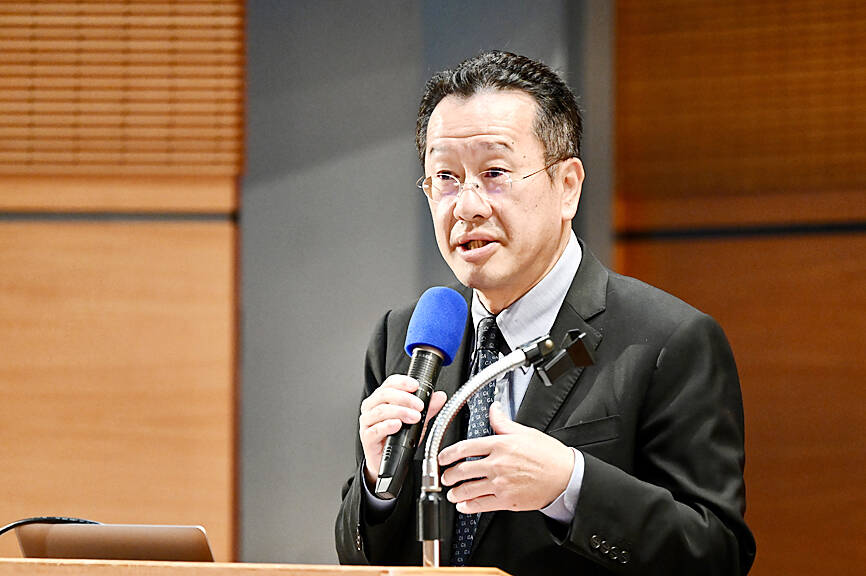Chinese President Xi Jinping (習近平) is unlikely to have the capability to successfully invade Taiwan by 2027, National Security Council (NSC) Secretary-General Wellington Koo (顧立雄) said yesterday, casting doubt on the progress of Beijing’s military modernization plans.
Taiwan would continue to delay the People’s Liberation Army’s (PLA) invasion timetable by strengthening its defense capabilities, Koo said.
“I don’t think it will happen in the near future or at least within one to two years,” Koo said of a Chinese invasion.

Photo: George Tsorng, Taipei Times
“If China needs to carry out amphibious landing operations to take Taiwan, I don’t think it will have such capabilities by 2027,” he said.
Koo declined to pinpoint when an attack could happen, saying only that Taiwan does not see Beijing making invasion preparations.
Beijing is already facing uncertainty next year from its own economic downturn, while the world must also deal with the US election, and wars in Europe and the Middle East, he said.
Xi is seeking to build a “world-class force” by 2027, a deadline that coincides with the 100th anniversary of the PLA.
Then-chairman of the US Joint Chiefs of Staff Mark Milley last year said that Beijing’s military would not be ready to invade Taiwan for “some time.”
Chairman of the US Joint Chiefs of Staff Charles Brown Jr last week said he doubts Beijing plans to take Taiwan militarily.
Koo said Taiwan would use mobile weapons such as anti-ship missiles, HIMARS, drones and Javelin anti-tank systems to make China’s landing operations more difficult in the event of an invasion.
The US plans to accelerate a HIMARS shipment by one year to 2026.
Earlier this month, Koo said the US government is taking steps to speed up the delivery of US weapons systems to Taiwan that have been delayed by factors including shipments to Ukraine.

Taiwan is stepping up plans to create self-sufficient supply chains for combat drones and increase foreign orders from the US to counter China’s numerical superiority, a defense official said on Saturday. Commenting on condition of anonymity, the official said the nation’s armed forces are in agreement with US Admiral Samuel Paparo’s assessment that Taiwan’s military must be prepared to turn the nation’s waters into a “hellscape” for the Chinese People’s Liberation Army (PLA). Paparo, the commander of the US Indo-Pacific Command, reiterated the concept during a Congressional hearing in Washington on Wednesday. He first coined the term in a security conference last

Prosecutors today declined to say who was questioned regarding alleged forgery on petitions to recall Democratic Progressive Party (DPP) legislators, after Chinese-language media earlier reported that members of the Chinese Nationalist Party (KMT) Youth League were brought in for questioning. The Ministry of Justice Investigation Bureau confirmed that two people had been questioned, but did not disclose any further information about the ongoing investigation. KMT Youth League members Lee Hsiao-liang (李孝亮) and Liu Szu-yin (劉思吟) — who are leading the effort to recall DPP caucus chief executive Rosalia Wu (吳思瑤) and Legislator Wu Pei-yi (吳沛憶) — both posted on Facebook saying: “I

The Ministry of Economic Affairs has fined Taobao NT$1.2 million (US$36,912) for advertisements that exceed its approved business scope, requiring the Chinese e-commerce platform to make corrections in the first half of this year or its license may be revoked. Lawmakers have called for stricter enforcement of Chinese e-commerce platforms and measures to prevent China from laundering its goods through Taiwan in response to US President Donald Trump’s heavy tariffs on China. The Legislative Yuan’s Finance Committee met today to discuss policies to prevent China from dumping goods in Taiwan, inviting government agencies to report. Democratic Progressive Party Legislator Kuo Kuo-wen (郭國文) said

The Ministry of Economic Affairs has fined Taobao NT$1.2 million (US$36,900) for advertisements that exceeded its approved business scope and ordered the Chinese e-commerce platform to make corrections in the first half of this year or its license would be revoked. Lawmakers have called for stricter supervision of Chinese e-commerce platforms and more stringent measures to prevent China from laundering its goods through Taiwan as US President Donald Trump’s administration cracks down on origin laundering. The legislature’s Finance Committee yesterday met to discuss policies to prevent China from dumping goods in Taiwan, inviting government agencies to report on the matter. Democratic Progressive Party